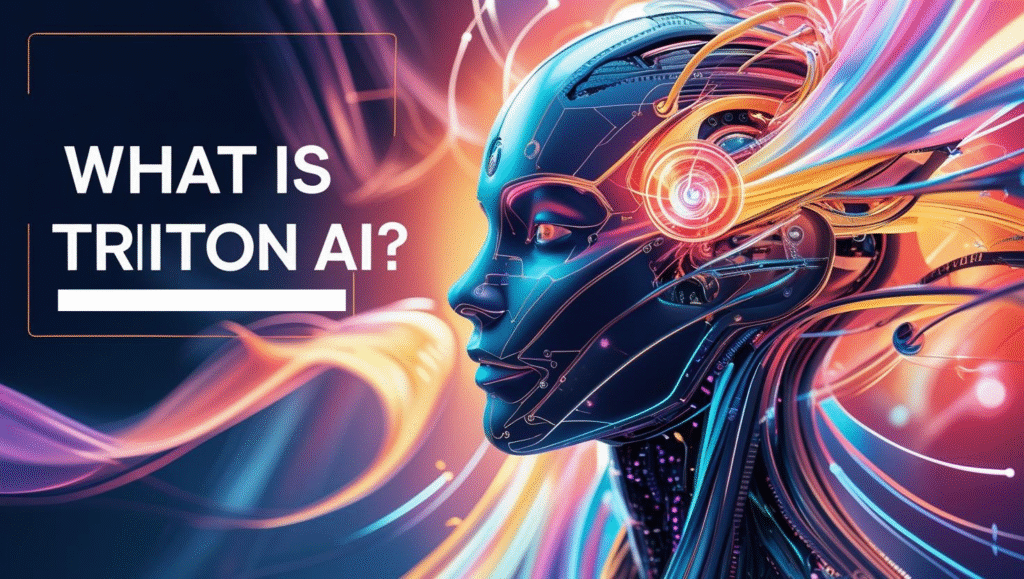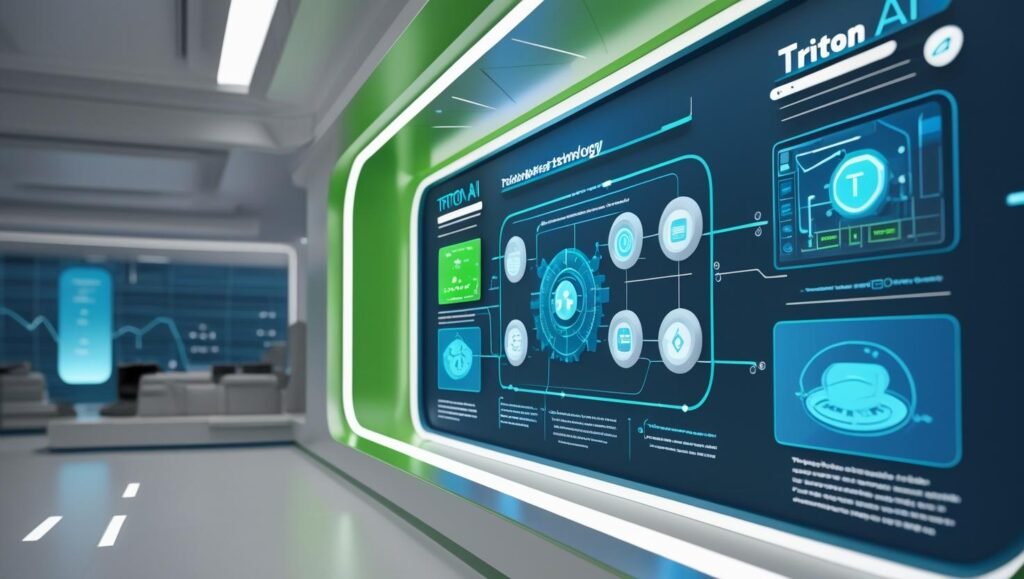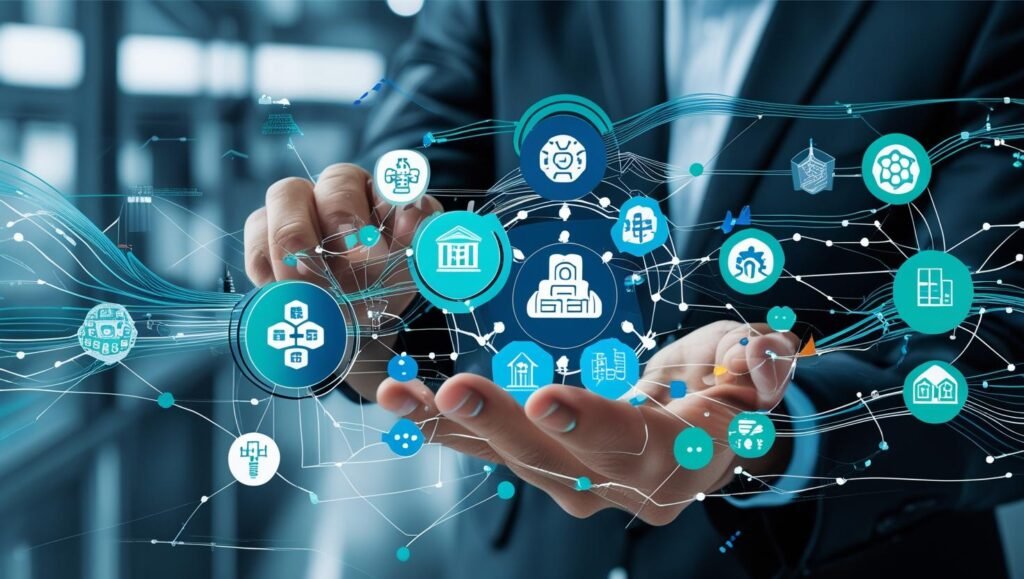What Is Triton AI? Breaking Down the Tech That’s Driving the Future of Business

In the rapidly evolving landscape of technology, Triton AI stands out as a game-changer, revolutionizing how businesses operate and innovate. Imagine an artificial intelligence system that not only enhances decision-making processes but also propels companies toward unprecedented efficiency and growth.
Triton AI harnesses vast amounts of data with advanced analytics, delivering strategic insights that empower organizations to stay ahead of the competition. As industries across the board grapple with digital transformation, understanding what Triton AI offers is crucial for businesses aiming to thrive in a data-driven world.
Join us as we break down the powerful capabilities of Triton AI and explore how this cutting-edge technology is shaping the future of business. Whether you’re a tech enthusiast or a business leader, this deep dive will illuminate the pivotal role Triton AI plays in forging innovative pathways and revolutionizing operational success. Don’t miss out on the tech that’s redefining possibilities!
What Is Triton AI? Breaking Down the Tech That’s Driving the Future of Business
The Evolution of Artificial Intelligence
Artificial Intelligence (AI) has come a long way since its inception. Initially, AI was a concept that existed primarily in the realm of science fiction, with early visions of intelligent machines dating back to the mid-20th century. Over the decades, significant advancements in computing power, data storage, and algorithmic sophistication have transformed AI from a theoretical idea into a practical and powerful tool. Today, AI is embedded in various aspects of our daily lives, from virtual assistants like Siri and Alexa to sophisticated algorithms that drive decision-making in industries such as finance, healthcare, and transportation.
One of the pivotal moments in the evolution of AI was the development of machine learning, a subset of AI that enables systems to learn from data and improve their performance over time without being explicitly programmed. This breakthrough allowed AI to move beyond simple rule-based systems to more complex and adaptive models capable of handling vast datasets and making accurate predictions. Deep learning, a further advancement in machine learning, utilizes neural networks with multiple layers to analyze data with high precision, leading to significant improvements in image and speech recognition, natural language processing, and autonomous systems.
As AI continues to evolve, the focus has shifted towards developing systems that can understand and interpret human behavior, emotions, and intent. This has led to the emergence of technologies such as reinforcement learning, where AI agents learn by interacting with their environment and receiving feedback, and generative adversarial networks (GANs), which can create realistic data samples. Triton AI represents the culmination of these advancements, offering a comprehensive and versatile AI platform that leverages the latest in machine learning, deep learning, and data analytics to drive business innovation and growth.
Key Features of Triton AI

Triton AI is designed to be a versatile and robust platform, offering a range of features that cater to the diverse needs of modern businesses. One of its standout features is its ability to process and analyze vast amounts of data in real-time. This capability is powered by advanced algorithms and high-performance computing infrastructure, enabling Triton AI to deliver insights and predictions that are both accurate and timely. Businesses can harness this power to make informed decisions, optimize operations, and identify new opportunities for growth.
Another key feature is its adaptability. The platform is designed to integrate seamlessly with existing business systems and workflows, making it easy to implement and scale. Triton AI supports a wide range of data sources, including structured and unstructured data, and can be customized to meet the specific needs of different industries and applications. This flexibility ensures that businesses can leverage Triton AI to address their unique challenges and achieve their strategic objectives.
Triton AI also excels in its user-friendly interface and accessibility. The platform is equipped with intuitive tools and dashboards that enable users to interact with data and insights without requiring specialized technical knowledge. This democratization of AI empowers employees at all levels of an organization to leverage data-driven insights in their daily tasks, fostering a culture of innovation and continuous improvement. Moreover, Triton AI provides robust security and compliance features, ensuring that data is protected and managed in accordance with industry standards and regulations.
How Triton AI Works: A Technical Overview
At the core of Triton AI is a sophisticated architecture that combines cutting-edge technologies in machine learning, deep learning, and data analytics. The platform utilizes a distributed computing framework that allows it to process large datasets efficiently and scale horizontally to accommodate growing data volumes. This architecture is supported by high-performance hardware, including GPUs and specialized accelerators, which enhance the speed and accuracy of data processing and model training.
Triton AI employs advanced machine learning algorithms to analyze data and generate predictive models. These algorithms are designed to handle various types of data, including numerical, categorical, and time-series data, and can be customized to address specific business problems. The platform also leverages deep learning techniques, such as convolutional neural networks (CNNs) and recurrent neural networks (RNNs), to analyze complex data types like images, audio, and text. This enables Triton AI to deliver sophisticated insights across a wide range of applications, from image recognition and natural language processing to predictive maintenance and fraud detection.
One of the key components of Triton AI is its data pipeline, which facilitates the ingestion, processing, and storage of data from multiple sources. The pipeline includes features for data cleansing, normalization, and enrichment, ensuring that the data used for analysis is accurate and relevant. Once the data is prepared, it is fed into machine learning models, which are trained using a combination of supervised, unsupervised, and reinforcement learning techniques. The models are continuously updated and refined based on feedback and new data, ensuring that they remain accurate and relevant over time.
Applications in Various Industries

Triton AI’s versatility makes it applicable across a wide range of industries, each benefiting from its advanced data analytics and machine learning capabilities. In the healthcare sector, for example, Triton AI can be used to analyze patient data and predict disease outbreaks, optimize treatment plans, and improve patient outcomes. By leveraging large datasets and sophisticated models, healthcare providers can gain valuable insights into patient behavior, treatment effectiveness, and operational efficiency, leading to better care and reduced costs.
In the finance industry, Triton AI is used for applications such as fraud detection, risk management, and algorithmic trading. Financial institutions can leverage Triton AI to analyze transaction data and identify patterns indicative of fraudulent activity, enabling them to respond quickly and mitigate risks. Additionally, Triton AI’s predictive capabilities can be used to assess credit risk, optimize investment portfolios, and automate trading strategies, enhancing decision-making and driving profitability.
Retail and e-commerce businesses also benefit from Triton AI’s capabilities, using it to enhance customer experiences, optimize inventory management, and personalize marketing efforts. By analyzing customer behavior and preferences, Triton AI can help businesses tailor their offerings and promotions to individual customers, increasing engagement and loyalty. In addition, Triton AI’s predictive analytics can be used to forecast demand, optimize pricing strategies, and streamline supply chain operations, ensuring that products are available when and where customers need them.
Benefits of Implementing Triton AI in Business
The implementation of Triton AI in business brings numerous benefits, enhancing both operational efficiency and strategic decision-making. One of the most significant advantages is the ability to process and analyze large volumes of data quickly and accurately. This enables businesses to gain real-time insights into their operations, identify trends and patterns, and make data-driven decisions that drive growth and innovation. By leveraging Triton AI, businesses can stay ahead of the competition and respond proactively to changing market conditions.
Another key benefit of Triton AI is its ability to automate repetitive and time-consuming tasks, freeing up employees to focus on more strategic and value-added activities. For example, Triton AI can be used to automate data entry, report generation, and customer service tasks, reducing the workload on employees and improving productivity. This automation not only enhances efficiency but also reduces the risk of human error, ensuring that processes are executed accurately and consistently.
Furthermore, Triton AI enables businesses to personalize their offerings and engage with customers more effectively. By analyzing customer data, Triton AI can identify individual preferences and behaviors, allowing businesses to tailor their products, services, and marketing efforts to meet the unique needs of each customer. This personalized approach enhances customer satisfaction and loyalty, driving repeat business and long-term success. Additionally, Triton AI’s predictive capabilities enable businesses to anticipate customer needs and proactively address issues, further enhancing the customer experience.
Case Studies:

Several businesses across various industries have successfully implemented Triton AI, achieving significant improvements in efficiency, decision-making, and customer satisfaction. One notable example is a leading healthcare provider that leveraged Triton AI to enhance patient care and optimize clinical operations. By analyzing patient data, the provider was able to identify high-risk patients, predict disease outbreaks, and develop personalized treatment plans, resulting in improved patient outcomes and reduced healthcare costs.
Another success story comes from the finance industry, where a major bank implemented Triton AI to enhance its fraud detection capabilities. By analyzing transaction data in real-time, the bank was able to identify and respond to fraudulent activity more quickly and accurately, reducing losses and enhancing security. Additionally, Triton AI’s predictive analytics helped the bank optimize its credit risk assessment processes, leading to better decision-making and improved financial performance.
In the retail sector, a global e-commerce company used Triton AI to enhance its customer engagement and optimize its supply chain operations. By analyzing customer behavior and preferences, the company was able to personalize its marketing efforts and tailor its product offerings to individual customers, resulting in increased sales and customer loyalty. Additionally, Triton AI’s demand forecasting capabilities helped the company optimize its inventory management and reduce stockouts, ensuring that products were available when and where customers needed them.
Challenges and Limitations of Triton AI
While Triton AI offers numerous benefits, it is not without its challenges and limitations. One of the primary challenges is the complexity of implementing and maintaining AI systems. Businesses need to invest in the necessary infrastructure, tools, and expertise to deploy and manage Triton AI effectively. This can be a significant investment, particularly for smaller businesses with limited resources. Additionally, businesses need to ensure that they have the necessary data governance and security measures in place to protect sensitive data and comply with regulations.
Another limitation of Triton AI is the potential for bias in the data and models. AI systems are only as good as the data they are trained on, and if the data contains biases, the models may produce biased results. This can lead to unfair or discriminatory outcomes, particularly in areas such as hiring, lending, and law enforcement. Businesses need to be aware of these risks and take steps to ensure that their data and models are fair and unbiased.
Finally, there is the challenge of ensuring that AI systems are transparent and explainable. As AI systems become more complex and sophisticated, it can be difficult to understand how they make decisions and predictions. This lack of transparency can be a barrier to trust and adoption, particularly in regulated industries where explainability is crucial. Businesses need to ensure that their AI systems are designed to be transparent and that they can provide clear and understandable explanations for their decisions and predictions.
What Lies Ahead for Triton AI

The future of Triton AI is shaped by ongoing advancements in AI and machine learning technologies, as well as the evolving needs of businesses. One of the key trends is the increasing integration of AI with other emerging technologies, such as the Internet of Things (IoT), blockchain, and edge computing. This convergence will enable Triton AI to leverage data from a wider range of sources and deliver even more accurate and timely insights. For example, combining Triton AI with IoT devices can enable real-time monitoring and predictive maintenance of industrial equipment, reducing downtime and improving operational efficiency.
Another trend is the growing focus on ethical AI and responsible AI practices. As businesses and regulators become more aware of the potential risks and biases associated with AI, there is a greater emphasis on ensuring that AI systems are fair, transparent, and accountable. Triton AI is likely to incorporate new tools and frameworks for auditing and mitigating bias, enhancing explainability, and ensuring compliance with ethical standards and regulations. This will help businesses build trust and confidence in their AI systems and ensure that they are used responsibly and ethically.
Finally, the future of Triton AI will be shaped by the increasing demand for personalized and customer-centric experiences. Businesses are increasingly looking for ways to engage with customers on a more personal and meaningful level, and Triton AI will play a key role in enabling this. By leveraging advanced analytics and machine learning, Triton AI will help businesses understand their customers better, anticipate their needs, and deliver personalized experiences that drive loyalty and satisfaction. This focus on personalization will be a key driver of innovation and growth in the coming years.
Conclusion:
In conclusion, Triton AI represents a powerful and transformative technology that is driving the future of business. By leveraging advanced data analytics, machine learning, and deep learning capabilities, Triton AI enables businesses to gain valuable insights, optimize operations, and innovate for growth. From healthcare and finance to retail and e-commerce, Triton AI is delivering significant benefits across a wide range of industries, enhancing efficiency, decision-making, and customer satisfaction.
However, the successful implementation of Triton AI requires careful planning and investment in the necessary infrastructure, tools, and expertise. Businesses need to be aware of the challenges and limitations, such as data bias and the need for transparency and explainability, and take steps to address these issues. By adopting ethical and responsible AI practices, businesses can build trust and confidence in their AI systems and ensure that they are used to drive positive outcomes.
As we look to the future, the potential of Triton AI is vast and exciting. By embracing this cutting-edge technology, businesses can stay ahead of the competition, respond proactively to changing market conditions, and deliver personalized experiences that drive loyalty and growth. Whether you’re a tech enthusiast or a business leader, understanding and leveraging the capabilities of Triton AI is crucial for thriving in a data-driven world. Don’t miss out on the tech that’s redefining possibilities and driving the future of business.
For the latest insights and updates, be sure to explore our AI Trends & News and stay ahead in the world of artificial intelligence.
